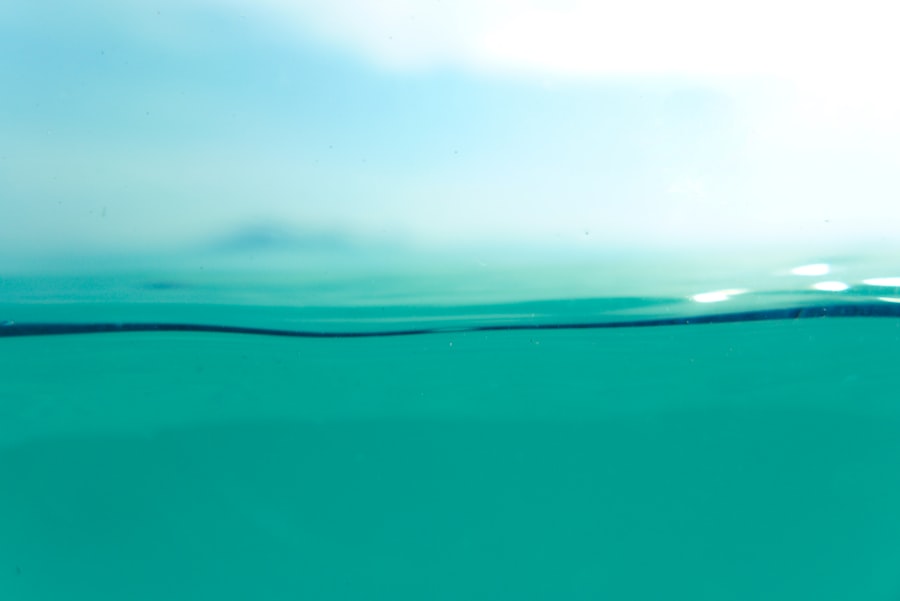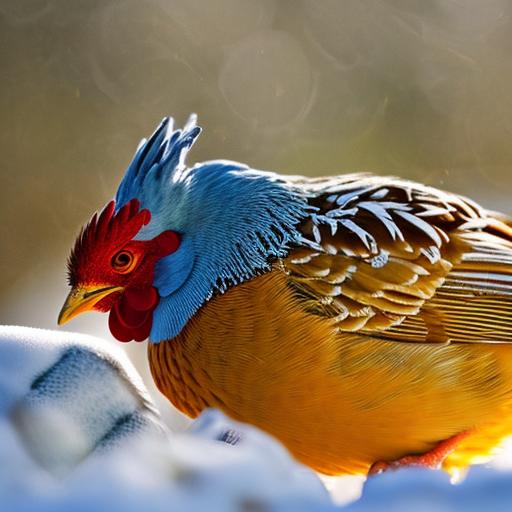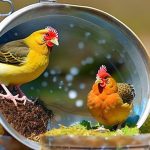Keeping chickens in winter can be a rewarding experience, but it also comes with its challenges. One of the biggest challenges is keeping their water from freezing. Frozen water can be dangerous for chickens, as it can lead to dehydration and other health problems. In this blog post, we’ll explore some alternative solutions for keeping your chickens’ water from freezing in winter.
Key Takeaways
- Keeping chickens’ water from freezing in winter is a challenge for many poultry keepers.
- Frozen water can lead to dehydration, illness, and even death in chickens.
- Alternative solutions include using heated waterers, insulating water containers, and DIY options.
- Preventing water spillage and monitoring water consumption are important for keeping chickens healthy and happy in winter.
- Using a solar-powered waterer can provide a sustainable and cost-effective solution for keeping chickens’ water from freezing.
Understanding the Risks of Frozen Water for Your Chickens
Water is essential for chickens’ health and well-being, and this is especially true in winter when they need to stay hydrated to keep warm. When water freezes, it becomes inaccessible to chickens, which can lead to dehydration. Dehydration can cause a range of health problems for chickens, including decreased egg production, weakened immune system, and even death.
Chickens need access to clean, fresh water at all times. In winter, they may not be able to find alternative sources of water like they can during other seasons. This makes it even more important for chicken owners to find effective solutions for keeping their water from freezing.
Alternative Solutions for Keeping Chickens’ Water from Freezing
Fortunately, there are several alternative solutions for keeping your chickens’ water from freezing in winter. Here are a few options to consider:
1. Using an insulated water container: Insulating your chickens’ water container can help keep the water from freezing. You can use materials like foam insulation or bubble wrap to insulate the container. This will help retain heat and prevent the water from freezing for longer periods of time.
2. Using a heated waterer: A heated waterer is a great option for keeping your chickens’ water from freezing. These waterers have a built-in heating element that keeps the water at a temperature above freezing point. They are designed specifically for cold weather conditions and are safe to use around chickens.
3. Using a solar-powered waterer: If you’re looking for an eco-friendly option, a solar-powered waterer is a great choice. These waterers use solar power to keep the water from freezing. They have a built-in solar panel that charges during the day and powers the heating element to keep the water at a suitable temperature.
4. DIY options: If you prefer a more hands-on approach, there are several DIY options for keeping your chickens’ water from freezing. For example, you can add salt to the water to lower its freezing point. You can also use a light bulb to heat the water or place a heated rock in the container to keep it warm.
Insulating Your Chickens’ Water Container for Winter
| Metrics | Description |
|---|---|
| Water temperature | The temperature of the water in the container |
| Container type | The type of container used for water |
| Insulation material | The material used to insulate the container |
| Insulation thickness | The thickness of the insulation material used |
| Frequency of water change | How often the water is changed in the container |
| Chickens’ water consumption | The amount of water consumed by the chickens |
| Weather conditions | The temperature and humidity levels outside |
Insulating your chickens’ water container is an effective way to prevent freezing. There are several materials you can use to insulate the container, such as foam insulation or bubble wrap.
Foam insulation is a popular choice because it provides excellent insulation and is easy to work with. You can cut pieces of foam insulation to fit around the sides and bottom of the container, creating a barrier between the cold air and the water inside. This will help retain heat and prevent freezing.
Bubble wrap is another option that can be easily wrapped around the container. The air pockets in the bubble wrap act as insulation, helping to keep the water from freezing for longer periods of time.
When insulating your chickens’ water container, make sure to secure the insulation properly so that it doesn’t come loose or get wet. This will ensure that it remains effective throughout the winter season.
Using a Heated Waterer for Your Chickens
A heated waterer is an excellent option for keeping your chickens’ water from freezing in winter. These waterers have a built-in heating element that keeps the water at a temperature above freezing point.
Heated waterers are designed specifically for cold weather conditions and are safe to use around chickens. They come in various sizes and styles, so you can choose one that suits your flock’s needs.
To use a heated waterer, simply fill it with water and plug it into a power source. The heating element will keep the water at a suitable temperature, preventing it from freezing. Some heated waterers also have thermostats that automatically adjust the temperature based on the surrounding conditions.
It’s important to regularly check and clean the heated waterer to ensure that it is functioning properly. This will help prevent any issues with freezing or contamination.
The Benefits of Using a Solar-Powered Waterer for Your Chickens

A solar-powered waterer is an eco-friendly option for keeping your chickens’ water from freezing in winter. These waterers use solar power to keep the water at a suitable temperature, which can save you money on your energy bill.
Solar-powered waterers have a built-in solar panel that charges during the day and powers the heating element. This means that they don’t require electricity to operate, making them a sustainable choice for chicken owners.
In addition to being environmentally friendly, solar-powered waterers are also easy to use. Simply fill the waterer with water and place it in an area where it can receive direct sunlight. The solar panel will charge during the day and keep the water at a temperature above freezing point.
It’s important to note that solar-powered waterers may not be as effective in areas with limited sunlight or during extended periods of cloudy weather. In these cases, you may need to supplement with other heating methods or consider alternative solutions.
DIY Options for Keeping Chickens’ Water from Freezing
If you prefer a more hands-on approach, there are several DIY options for keeping your chickens’ water from freezing in winter. Here are a few ideas to consider:
1. Adding salt to the water: Salt lowers the freezing point of water, making it more resistant to freezing. You can add a small amount of salt to your chickens’ water to help prevent freezing. However, it’s important to use salt sparingly, as excessive amounts can be harmful to chickens.
2. Using a light bulb to heat the water: You can use a regular incandescent light bulb to heat your chickens’ water. Simply place the light bulb near the water container, making sure it is securely mounted and protected from moisture. The heat from the light bulb will help keep the water at a suitable temperature.
3. Using a heated rock: Another DIY option is to use a heated rock to keep your chickens’ water warm. You can heat a rock in an oven or microwave and then place it in the water container. Make sure to wrap the rock in a towel or cloth to prevent direct contact with the chickens.
It’s important to note that DIY options may not be as effective or safe as commercially available solutions. If you choose to use DIY methods, make sure to monitor them closely and ensure that they are not causing any harm to your chickens.
Tips for Preventing Water Spillage in Winter
Water spillage can lead to frozen water and other problems for your chickens. To prevent water spillage, make sure your water container is stable and secure. Here are some tips:
1. Choose a sturdy container: Use a water container that is designed for poultry and is stable enough to withstand winter conditions. Avoid using containers that are easily tipped over or prone to leakage.
2. Elevate the container: Elevating the water container can help prevent spillage caused by snow or ice buildup. Place the container on a platform or cinder blocks to keep it off the ground.
3. Provide shelter: Place the water container in a sheltered area, such as a coop or run, to protect it from wind and precipitation. This will help prevent water spillage and freezing.
Regularly check the water container for any signs of leakage or damage. Repair or replace it as needed to ensure that your chickens have access to clean, fresh water at all times.
Monitoring Your Chickens’ Water Consumption in Winter
It’s important to monitor your chickens’ water consumption in winter to make sure they’re staying hydrated. If you notice a decrease in water consumption, it could be a sign that your chickens’ water is frozen or inaccessible.
Check the water container regularly to ensure that it is not frozen or empty. If necessary, refill the container with fresh water and make any adjustments to prevent freezing.
In addition to monitoring water consumption, also keep an eye on your chickens’ overall health and behavior. Dehydration can cause a range of symptoms, including lethargy, decreased appetite, and dry or pale combs and wattles. If you notice any signs of dehydration, take immediate action to provide your chickens with access to clean, unfrozen water.
Keeping Your Chickens Healthy and Happy in Winter
Keeping your chickens’ water from freezing in winter is essential for their health and well-being. By using alternative solutions like insulated water containers, heated waterers, and solar-powered waterers, you can ensure that your chickens have access to clean, fresh water at all times.
Remember to regularly check and maintain the water container to prevent freezing and contamination. Monitor your chickens’ water consumption and overall health to ensure that they are staying hydrated and thriving during the winter season.
With proper care and attention, you can keep your chickens healthy and happy throughout the winter months.
If you’re looking for ways to keep your chickens’ water from freezing without electricity, you’ll definitely want to check out this helpful article from Poultry Wizard. They provide some great tips and tricks to ensure your chickens have access to water even in the coldest temperatures. From insulating your water containers to using heated bases, this article covers it all. Don’t let freezing temperatures stop your chickens from staying hydrated – click here to read the full article: https://poultrywizard.com/keeping-chickens/how-to-keep-chickens-water-from-freezing-without-electricity/
FAQs
What is the problem with chicken water freezing?
During winter, the water in chicken coops can freeze, making it difficult for chickens to access water. This can lead to dehydration, which can cause health problems and even death.
What are some ways to keep chicken water from freezing?
There are several ways to keep chicken water from freezing, including using heated waterers, insulating waterers, using heated bases, and adding salt to the water.
What is a heated waterer?
A heated waterer is a device that keeps water from freezing by using electricity to heat the water. These waterers are available in different sizes and styles, and can be used both indoors and outdoors.
What is an insulated waterer?
An insulated waterer is a device that keeps water from freezing by using insulation to keep the water warm. These waterers are available in different sizes and styles, and can be used both indoors and outdoors.
What is a heated base?
A heated base is a device that keeps water from freezing by using electricity to heat the base of the waterer. These bases are available in different sizes and styles, and can be used both indoors and outdoors.
How does adding salt to the water help prevent freezing?
Adding salt to the water lowers the freezing point of the water, making it less likely to freeze. However, it is important to use the correct amount of salt, as too much salt can be harmful to chickens.
Meet Walter, the feathered-friend fanatic of Florida! Nestled in the sunshine state, Walter struts through life with his feathered companions, clucking his way to happiness. With a coop that’s fancier than a five-star hotel, he’s the Don Juan of the chicken world. When he’s not teaching his hens to do the cha-cha, you’ll find him in a heated debate with his prized rooster, Sir Clucks-a-Lot. Walter’s poultry passion is no yolk; he’s the sunny-side-up guy you never knew you needed in your flock of friends!







